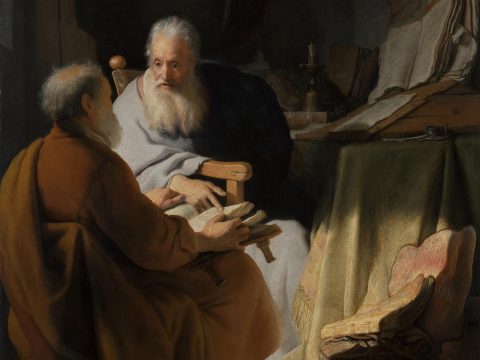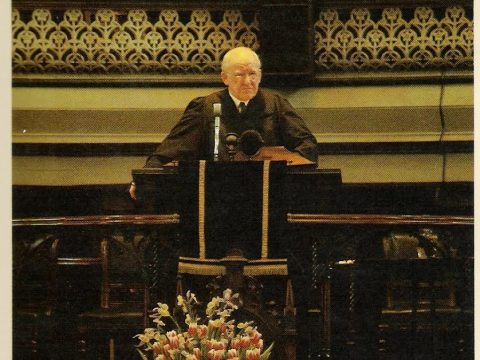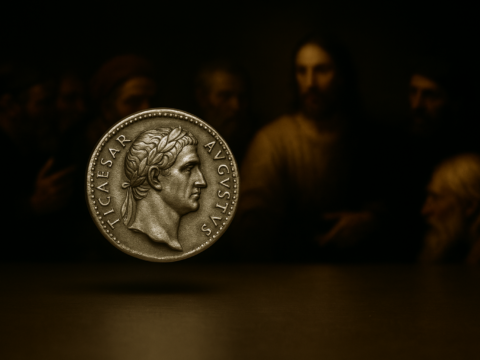
Christians I say are to look at the hope of their calling. These are the things are the result of sin and division. The world was never meant to be divided into Jew and Gentile, barbarian and Scythian, bond nor free, high or low, great and small. That’s man, that sin, that’s the devil; and we must never look back at those things. We must look forward to the hope of our calling and that is one and that is always the same; but let me put it like this also in the second principle.
We must not only not look back and dwell upon that from which we were saved. We must not even dwell upon our conversion experiences. I mean now the actual experience of conversion. I am no longer speaking of the life out of which you’ve come, but the actual event or the actual experience of conversion. Because here again you see is something that inevitably tends to divide us.
There are some people who had a very dramatic conversion. They may have undergone agonies of repentance and remorse. It may have lasted a long time and at last in some most dramatic moment, they saw the light and were saved.
There are others, who rarely cannot give you the exact moment the exact time of their conversion. It was quiet it was almost unobserved. They can’t I say identify any particular event or moment, but what they do know is that whereas they were once dead, they’re now alive. They know that they love the Lord Jesus Christ and they desire him above everything else and want to be with him and to be like him.
But you see the two types of experience are very different. And as a pastor and a minister I can testify to the harm and the damage and the divisions and the distinctions that stressing the form of conversion experience has in the life of the church.
It works in many ways. Sometimes it does great harm to the man himself who’s had the dramatic conversion. He becomes proud of it. He becomes the kind of showpiece and he’s a different Christian from the others and he tends to despise the man who isn’t quite sure of the way in which it happened or when it happened; and on the other hand this person who’s had the quiet experience, he sometimes is made to think that perhaps is not a Christian at all, because his experience doesn’t conform to the dramatic pattern. He’s given the impression in meetings that only the dramatic is the truth because the quiet people are never called forward and so he says well I wonder whether I really am a Christian, am I really in the Kingdom or not and you have divisions and distinctions, flashing experiences, quiet experiences, and thus these wrong and sinful divisions and schisms enter into the life of the church.
Perhaps again I can best put this by repeating something I once heard the famous John McNeil say in this connection and I think it was very good. He was imagining a conversation between two of the blind men that were healed by our Lord and Savior Jesus Christ. He was imagining a conversation between the blind man whose healing is recorded in the 9th chapter of John and the blind man whose healing is recording the 8th chapter of the Gospel according to St. Mark.
You remember the differences don’t you. In the case of the man in the 9th chapter of John our Lord spat upon some clay on the ground and he mixed it and he anointed the man’s eyes with a mixture of clay and spittle and told him to go and wash in the pool of Siloam. In this case of the man in the 8th of Mark, he did nothing of the sort.
And John McNeil was imagining these two men meeting later on and having a conversation together and he put it in his own inimitable way like this.
The man in the 9th of John said to the man in the 8th of Mark, he said “What did you feel like when he put on your eyes that mixture of clay and spittle?” “Clay and spittle?” said the man in Mark 8. “I don’t know anything about clay and spittle.” “What?” said the other man. “Don’t you remember while when he spat upon the ground and he made the mixture and then put it on your eyes well I’m asking what did you feel?” But he said, “There was nothing put on my eyes.” And on and on the conversation went. The man in the 9th of John bringing out his questions and the other man displaying ignorance and at last the man in the 9th of John said to the other, “Look here,” he said. “I don’t think you’ve been healed at all. You must still be blind. If he didn’t put the clay on your eyes, it’s still a fact that you can’t see.” Quite right. In other words, said John McNeil, because they were both looking back at their experiences, two religious denominations came into being at once, the Mudites and the Anti-Mudites.
Martyn Lloyd-Jones



